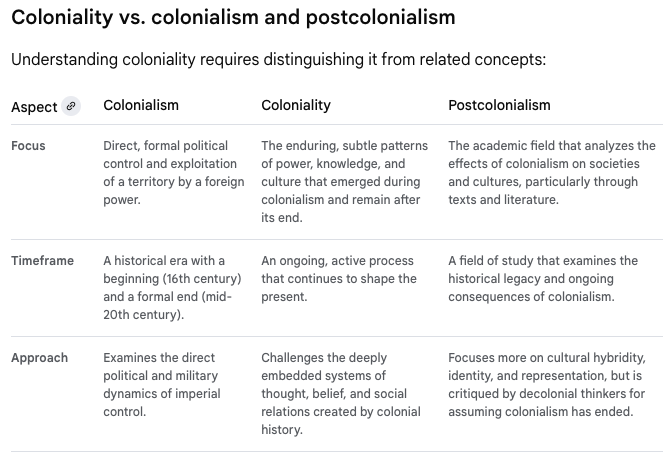Coloniality
refers to the enduring structures of power, culture, knowledge, and
social hierarchy that emerged from European colonialism but continue to
shape societies long after formal colonial administrations have ended.
It involves a deeply embedded system of "western dominance" where
certain values, ways of knowing, and ways of being are considered
normative, often through racial and gender hierarchies, which serves to
maintain power imbalances. The concept of the "coloniality of power"
and the "coloniality of knowledge," central to decolonial theory,
highlights how these systems perpetuate exploitation and domination by
establishing a global hierarchy of knowledge and being.
|
植
民地性(コロニアリティ)は、ヨーロッパの植民地主義から生まれた権力、文化、知識、社会階層の永続的な構造を指す。これらは正式な植民地統治が終わった
後も、長く社会を形成し続けている。そこには深く根付いた「西洋優位」のシステムが存在する。特定の価値観、認識方法、存在様式が規範と見なされ、しばし
ば人種や性別の階層を通じて、権力の不均衡を維持する役割を果たすのだ。脱植民地化理論の中核をなす「権力の植民地性」と「知識の植民地性」という概念
は、こうしたシステムが知識と存在のグローバルな階層を確立することで、搾取と支配を永続化させる仕組みを浮き彫りにする。
|
Coloniality
refers to the long-standing, global patterns of power, knowledge, and
culture that emerged from the history of European colonialism and
continue to influence the world today. Unlike colonialism, which ended
with the formal independence of many nations, coloniality is the
enduring legacy embedded within contemporary social, political, and
economic systems.
Decolonial thinkers trace the origin of coloniality to the 16th-century
European colonization of the Americas. They argue that this historical
event fundamentally shaped the world by establishing racialized
hierarchies that positioned Europeans as superior. This system of
domination—often called the "colonial matrix of power"—is seen as the "darker side" or constitutive element of Western modernity.
|
植
民地性は、ヨーロッパの植民地主義の歴史から生まれ、今日の世界に影響を与え続けている、長年にわたる世界的な権力・知識・文化のパターンを指す。多くの
国民が形式的に独立したことで終焉を迎えた植民地主義とは異なり、植民地性は現代の社会的・政治的・経済的システムに埋め込まれた永続的な遺産である。
脱植民地主義の思想家たちは、コロニアリティの起源を16世紀のヨーロッパによるアメリカ大陸植民地化に求める。彼らは、この歴史的出来事が人種化された
階層構造を確立し、ヨーロッパ人を優位に位置づけることで世界を根本的に形作ったと主張する。この支配システム——しばしば「植民地主義的権力マトリック
ス」と呼ばれる——は西洋近代性の「暗部」あるいは構成要素と見なされている。
|
Key Aspects of Coloniality
Survival beyond colonialism:
Coloniality persists even after direct colonial rule ceases, affecting
aspects of modern life such as culture, labor, interpersonal
relationships, and even the perception of time.
Racial and Gender Hierarchies:
Coloniality created and sustained racial and gender hierarchies, which
were then used to rationalize exploitation and maintain power
structures.
Knowledge Production:
The "coloniality of knowledge" involves the systematic suppression of
non-Western belief systems and knowledge, and the appropriation and
devaluation of that which doesn't serve colonial goals.
Global Hierarchies:
It establishes a ranking of societies and individuals, often
categorizing the world into "First World" and "Third World" or
"developed" and "underdeveloped" to perpetuate a sense of Western
superiority and modernity as the universal standard.
Dehumanization:
A core feature is the dehumanization of colonized peoples, whose
cultures and communities are seen as inherently worthless, with only
certain parts being extracted or appropriated for individualist
capitalist goals.
|
植民地性の主要な側面
植民地主義を超えた生存:
直接的な植民地支配が終結した後も植民地性は持続し、文化、労働、人間関係、さらには時間の認識といった現代生活の諸側面に影響を及ぼす。
人種と性別の階層構造:
植民地性は人種と性別の階層構造を創出し維持し、それが搾取を正当化し権力構造を維持するために利用された。
知識の生産:
「知識の植民地性」とは、非西洋的な信念体系や知識を体系的に抑圧し、植民地主義の目的に沿わないものを収奪・軽視する行為を指す。
グローバルな階層構造:
これは社会や個人に序列をつけ、世界を「第一世界」と「第三世界」あるいは「先進国」と「発展途上国」に分類することで、西洋の優越性と近代性を普遍的基準として永続させる。
非人間化:
中核的特徴は被植民地人民の非人間化である。彼らの文化や共同体は本質的に無価値と見なされ、個人主義的資本主義的目標のために特定の部分のみが抽出・収奪される。
|
Key dimensions of coloniality
The concept is broken down into three interrelated dimensions that perpetuate a Eurocentric world order:
Coloniality of power:
This refers to the systems of hierarchical social classification and
labor exploitation established during colonization that persist today.
Race is central to this dimension, creating and solidifying a global
division of labor that assigns different types of work and levels of
social status based on phenotype and racial identity.
Coloniality of knowledge:
This describes the dominance of a Eurocentric worldview and knowledge
system. It involves the suppression and invalidation of indigenous and
non-Western epistemologies (ways of knowing). Academic criteria,
educational curricula, and global rankings continue to reflect and
reinforce this intellectual hierarchy.
Coloniality of being:
This dimension addresses the dehumanization and negation of the
formerly colonized peoples' lived experiences and identities. The
colonized subject's full humanity is denied, leading to lasting
psychological and existential impacts.
|
植民地性の主要な次元
この概念は、ヨーロッパ中心の世界秩序を永続させる三つの相互に関連する次元に分解される:
権力の植民地性:
これは植民地時代に確立され、今日まで持続する階層的な社会的分類と労働搾取のシステムを指す。人種はこの次元の核心であり、表現型と人種的アイデンティティに基づいて異なる種類の労働と社会的地位のレベルを割り当てる世界的な分業体制を創出し、固着させる。
知識の植民地性:
これはヨーロッパ中心的な世界観と知識体系の優位性を説明する。先住民や非西洋的な認識論(知の方法)の抑圧と無効化を伴う。学術的基準、教育カリキュラム、世界ランキングは、この知的階層を反映し強化し続けている。
存在の植民地性:
この次元は、かつて植民地化された人民の生きた経験とアイデンティティに対する非人間化と否定を扱う。植民地化された主体の完全な人間性が否定され、持続的な心理的・実存的影響をもたらす。
|
Decoloniality
Decoloniality is the movement or project to analyze, confront, and
dismantle coloniality. It is not just about political independence but
also about "delinking" from the colonial matrix of power. A key goal of
decoloniality is to reclaim and center non-Western knowledge systems,
worldviews, and social practices.
|
脱植民地性
脱植民地性とは、植民地性を分析し、対峙し、解体する運動またはプロジェクトである。それは単なる政治的独立だけでなく、植民地的な権力構造からの「脱
却」をも意味する。脱植民地性の主要な目標は、非西洋的な知識体系、世界観、社会実践を取り戻し、中心に据えることである。
|
Coloniality vs. colonialism and postcolonialism
Understanding coloniality requires distinguishing it from related concepts:

|
植民地性〈対〉植民地主義とポストコロニアル主義
植民地性を理解するには、関連概念との区別が必要である:

|
Key Theorists
Aníbal Quijano:
The Peruvian sociologist who is recognized for developing the concept of the "coloniality of power".
Walter Mignolo:
A scholar who further developed the idea of the coloniality of knowledge and its role in global systems of oppression.
|
主要な理論家
アニバル・キハノ:
「権力の植民性」という概念を提唱したペルーの社会学者である。
ウォルター・ミニョーロ:
知識の植民性とその抑圧的グローバルシステムにおける役割をさらに発展させた学者である。
|
|
|
|
|
|
|

